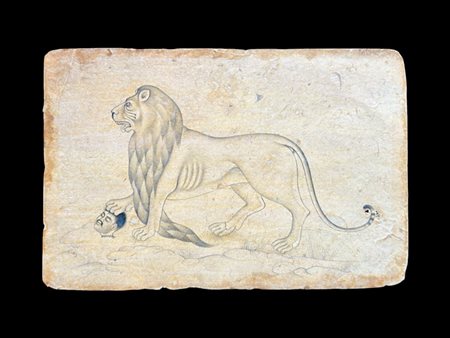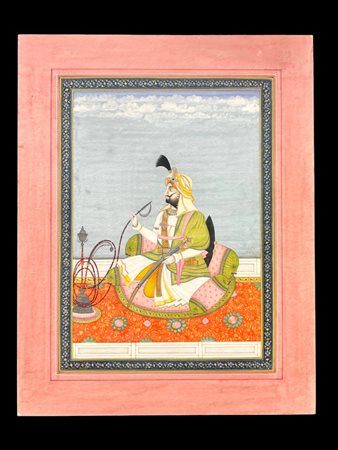Pre-Asta Islamic and Indian art from a Private Collection in Rome and other provenances. In partnership with BAIAS Arte.
-

Lotto 145 Drawing depicting a lion
India, 19th - 20th century
Pencil sketch on paper depicting a lion in a proud attitude above the severed head of a man.
Provenance: Private collection Tuscany.
10 X 15.4 cm -

Lotto 146 Shri Nathji in a pink pavilion
Nathdwara, mid- to late 19th century
The painting depicts a celebration taking place in the Shri Nathji temple of Nathdwara, Rajasthan. Shri Nathji, the most important icon of the Vallabha Sampradaya, is a black marble sculpture that represents Krishna as a child with the left arm raised in the stance of keeping mount Govardhan aloft. The icon wears a four-pointed full-length coat in saffron color with silver trimming and it is placed in a raised pavilion covered with pink roses. The liturgy, performed by the priest on the left, was probably sponsored by the family of devotees standing on the right. Provenance: Venetian private collection.
H. 26,8 x 34,7 cm -

Lotto 147 Painting depicting the underworld
Northern India or Nepal, 18th - 19th century
Tempera on paper, depicting a multitude of characters engaged in torture and passings on a green background. It has not been possible to clearly distinguish to which Indian religion it is attributable, perhaps close to the seven levels of Jain hell.
H. 35 X 45.4 cm -

Lotto 148 Portrait of Sikh Maharaja
Northern India, Pahari, 19th century
Gouache on paper.
Depicting a ruler, possibly Maharaja Sher Singh (r. 1841-1843) smoking a water pipe on a terrace, seated on a floral carpet with a red background.
Provenance: Private collection Tuscany.
H. 26 X 18.5 cm (h. 34 X 26 cm complessivo) -

Lotto 149 Hunting scene
Central to South India, possibly Deccan, 19th - early 20th century
Gouache painting on cardboard depicting two men riding, one on a prancing horse, the other on an elephant.
Provenance: Private collection Tuscany.
12.8 X 17.9 cm -

Lotto 150 Portrait of Thakur
Central-South India, Deccan, first half 20th century
Portrait of a nobleman on horseback, preceded and followed by grooms. The style is highly stylised and the background characterised by a modern bright green. Details in gold.
Provenance: Private collection Tuscany.
29.7 X 20.2 cm -

Lotto 151 Sikh painting depicting a courtly scene
Northern India, Pahari, Guler, first half 19th century
Gouache on paper.
Within a refined setting characterised by a sumptuous white marble building with floral inlays and chiselling, the scene has six high-ranking Sikh characters arranged two per archway, the last on the right also including an attendant in the corner, all under an orange canopy. The characters are in their well-groomed and colourful robes and turbans typical of the Sikh religion. The main characters are in a central position, on the left of the composition an attendant is waving a fly-whisk and on the right one of the characters is carrying a white drape.
Guler was administered by Sikh rulers from 1813 to 1849 when it fell into British hands. During this period the artists of Guler obtained many commissions from Sikh wealthy patrons and this painting fits into this context.
Provenance: Private collection Tuscany.
H. 22 X L. 31.5 cm (h. 27 X 40 cm complessivo) -

Lotto 152 Sikh painting depicting a courtly scene
Northern India, Pahari, 19th century
Gouache on paper
A refined miniature painting possibly depicting the young Maharaja Nau Nihal Singh (r. 1821 - 1840) seated on a gilded throne in the outer pavilion of a palace, enjoying a traditional dance (Nautch) performed by two ladies. The composition is quite crowded and features players on the right, attendants of the ruler on the left and two dancers in the centre of a huge carpet with floral decoration on a red background. White marble architecture and forest in the distance, beyond the parapet that locates the scene on a terrace.
Provenance: Private collection Tuscany.
H. 28.5 X L. 40 cm (33 X 45 cm complessivo) -

Lotto 153 Sikh painting depicting two sons of Raja Gulab Singh of Jammu
Northern India, Pahari, 19th century
Gouache on paper.
Gulab Singh was a high official in the court of the Sikh Emperor Maharaja Ranjit Singh and one of the most powerful leaders of the Sikh empire. After Ranjit Singh's death in 1839, Gulab Singh continued to play a crucial role in the politics of the region and later became the Maharaja of Jammu and Kashmir. Gulab and his brother Dhian were prominent figures in the history of 19th century Jammu and Kashmir, so much so that they are called the 'Dogra brothers' after the historical Duggar region.
Provenance: Private collection Tuscany.
H. 22 X l. 27.5 cm (26.5 X L. 38.5 cm complessivo) -

Lotto 154 Equestrian portrait of Aurangzeb Sultanate
India, possibly Deccan, 18th - 19th century
Depicting the last of the great Moghals in profile, riding a prancing horse. Colourless background and soil with scattered grass plants. Provenance: Private collection Tuscany.
28 X 21.5 cm -

Lotto 155 Small Jain devotional painting depicting Vimalanatha
Northern India, 19th century
Tempera on paper, depicting the thirteenth tirthankara of the present era, seated in padmasana, flanked by two worshippers. Short devanagari inscription on the upper edge.
H. 8 X L. 7 cm -

Lotto 156 Painting depicting a couple Mogul
India, late 19th century
Tempera and gold on paper, probably part of a Ragamala, a popular subject in Rajput India, depicting Indian musical modes and adopted in the Mughal ateliers since the 17th century.The painting depicts a couple sitting on a floral carpet on a terrace with white marble architecture inlaid with semiprecious stones with floral decorations. Through the door on the left of the composition, a handmaiden enters with a tray of refreshments in her hand. The two gushing fountains at the bottom indicate the setting in a Mogul chaharbagh (quadripartite garden).
H. 22 X L. 15 cm -

Lotto 157 A leaf from a manuscript depicting Durga
Nepal, 19th century
One side depicts armed Durga standing on her mount, the lion, and triumphant over the buffalo demon. The reverse side bears twelve lines of text in Devanagari.
Provenance: Private collection Tuscany
11.4 X 14.1 cm -

Lotto 158 A Suzani fabric fragment
Turkey or Central Asia, first half 20th century
Embroidery with coloured cotton threads in the classic Suzani style, depicting floral racemes within a large rectangular reserve bordered with smaller plant elements. -

Lotto 159 Equestrian portrait of Thakur
Northern India, Rajasthan, Marwar, 19th century
Depicting a nobleman on horseback, preceded by the groom and followed by two attendants with fly-whisks. Green background and blue sky in the thin strip on the upper margin of the painting.
Three lines of inscription in Devanagri in the cartouche below the horse name the protagonist as Shri Maharaja Shri Pratapasi Jisava, various honorary titles, but it was not possible to identify him precisely.
The back of the painting bears the stamp of the collection of Kumar Sangram Singh, Thakur of Nawalgarh, a historical region in Rajasthan. The stamp classifies the painting as No. 6 in the collection. Kumar Sangram Singh was active in the XX century and known to be a patron of the arts, owing also several manuscripts, paintings and works of art.
H. 30.6 X L. 24.8 cm -

Lotto 160 Portable Vaishnava altar
South India, Thanjavur, 19th century
rectangular, made of wood with deities in polychrome and gilded stucco protected by glass. In the centre stands the figure of Vishnu flanked by two figures, probably the donors. In the side wings two deities in varadamudra.
H. 19.7 X L. 14.7 X P. 7 cm -

Lotto 161 Thanjavur painting
Southern India, Tamil Nadu, 19th century
Pigments and stucco on board
A fine devotional painting in the classical Thanjore style, depicting a rare subject of a female deity within a gilded arch with two honorary canopies. The deity is flanked by two Brahmins with their hands joined to their chests in anjalimudra.
Defects.
33 X H. 40 cm -

Lotto 162 Two embossed silver devotional figures
Southern India, late 18th - early 19th century
One depicting the celebration from the liberation of Sita from Lanka within a tripartite arch framing Rama, Sita and Humayun in a central position with attendants on either sides.The other depicting Gajalakshmi with two elephants and surmounted by festoons in the European Baroque style.
Il più alto 20 cm (cornice: 24 X h. 29 X p. 3.5 cm) -

Lotto 163 Small bidri box in the shape of a mango
India, Bidar, early 20th century
7,5 X 4 cm -

Lotto 164 Two engraved carnelian plaques (aqiq)
Iran, early 20th century
Both bearing shia religious inscriptions. The small one with a silver mount.
Provenance: Venetian private collection.
37 X 48 mm (the largest) -

Lotto 165 A carnelian (aqiq) talismanic pendant
Iran, 19th century
Drop-shaped carving, engraved with talismanic inscriptions and within a gold mount. For a comparative specimen cfr. Metropolitan Museum New York, Acc. no. 1971.105.31.
Provenance: Venetian private collection.
27 mm -

Lotto 166 A gold foil plated pendant
India, 18th century
Small embossed pendant with central depiction of Krishna flanked by two attendants and standing on a lotus flower base.
Provenance: Private collection, Brescia, Italy.
H. 5 X 4.5 cm -

Lotto 167 Mughal emerald root mounted as a ring
Northern India, 18th century
Ring mounted in 18 K. white gold with brilliants. 1970s mount by Veschetti, Brescia, hallmarked 750. The mount encloses an emerald root engraved with a central flower and petals on the side.
Provenance: Private collection, Brescia, Italy.
H. 4 X L. 3 cm -

Lotto 168 Bronze casting depicting Durga Mahishasura Mardini
Southern India, 18th century
Cast bronze depicting the female deity overriding the buffalo from which she extracts the demon with her left hand. The two secondary hands brandish two weapons: the disc and the sword
5.5 X 4 X H. 9 cm
